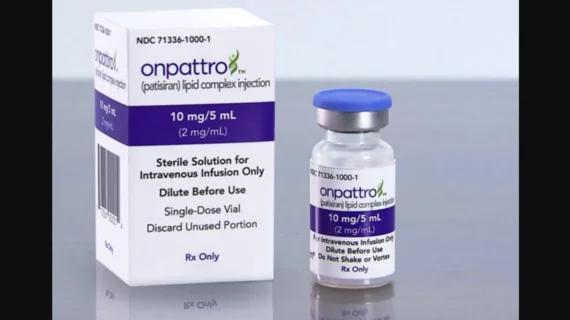Alnylam Pharmaceuticals has announced that the U.S. Food and Drug Administration (FDA) rejected its request for patisiran to be approved to treat cardiomyopathy from hereditary transthyretin-mediated (ATTR) amyloidosis.
Patisiran, marketed under the name Onpattro, is already approved by the FDA to treat polyneuropathy related to ATTR amyloidosis. This latest decision from the FDA does not impact the commercial availability of patisiran, it is still approved for that initial indication.
“First and foremost, our hearts go out to patients with the cardiomyopathy of ATTR amyloidosis who are living with a rapidly progressive, debilitating and fatal disease and face significant unmet need,” Yvonne Greenstreet, MBChB, CEO of Alnylam Pharmaceuticals, said in a prepared statement. “While we are disappointed by this decision, we are committed to supporting them and are well positioned to address their needs with continued innovation that can potentially help improve their outcomes and treatment experience.”
After reviewing all of the available evidence, the FDA ultimately determined that the clinical meaningfulness of treating ATTR cardiomyopathy with patisiran had not been established. The agency did not raise any specific red flags about safety or the quality of the drug.
Back in September, the FDA’s Cardiovascular and Renal Drugs Advisory Committee had voted in favor of approving this expanded indication for patisiran, noting that the benefits outweighed any potential risks. The decisions made by these committees are typically, but not always, a sign of how the FDA will ultimately rule.
After receiving this news from the FDA, Alnylam Pharmaceuticals is no longer pursuing this expanded indication. Instead, the company is continuing its work on gaining regulatory approval for vutrisiran, an investigational medication that is also being designed to target ATTR amyloidosis.
“We remain confident in the HELIOS-B Phase 3 study of vutrisiran and look forward to sharing topline results in early 2024,” Greenstreet said. “If successful, we believe vutrisiran will offer convenient, quarterly subcutaneous dosing with a therapeutic profile that may potentially include cardiovascular outcome benefits.”

